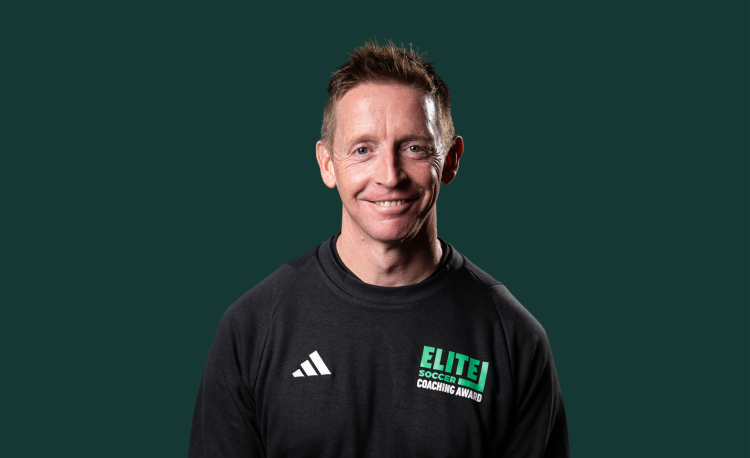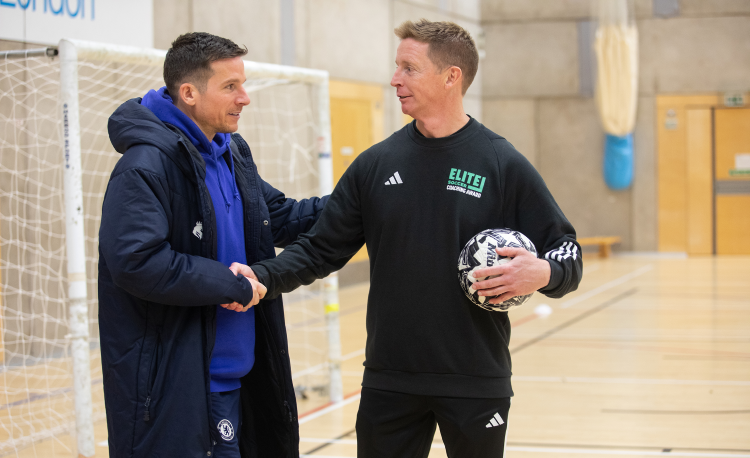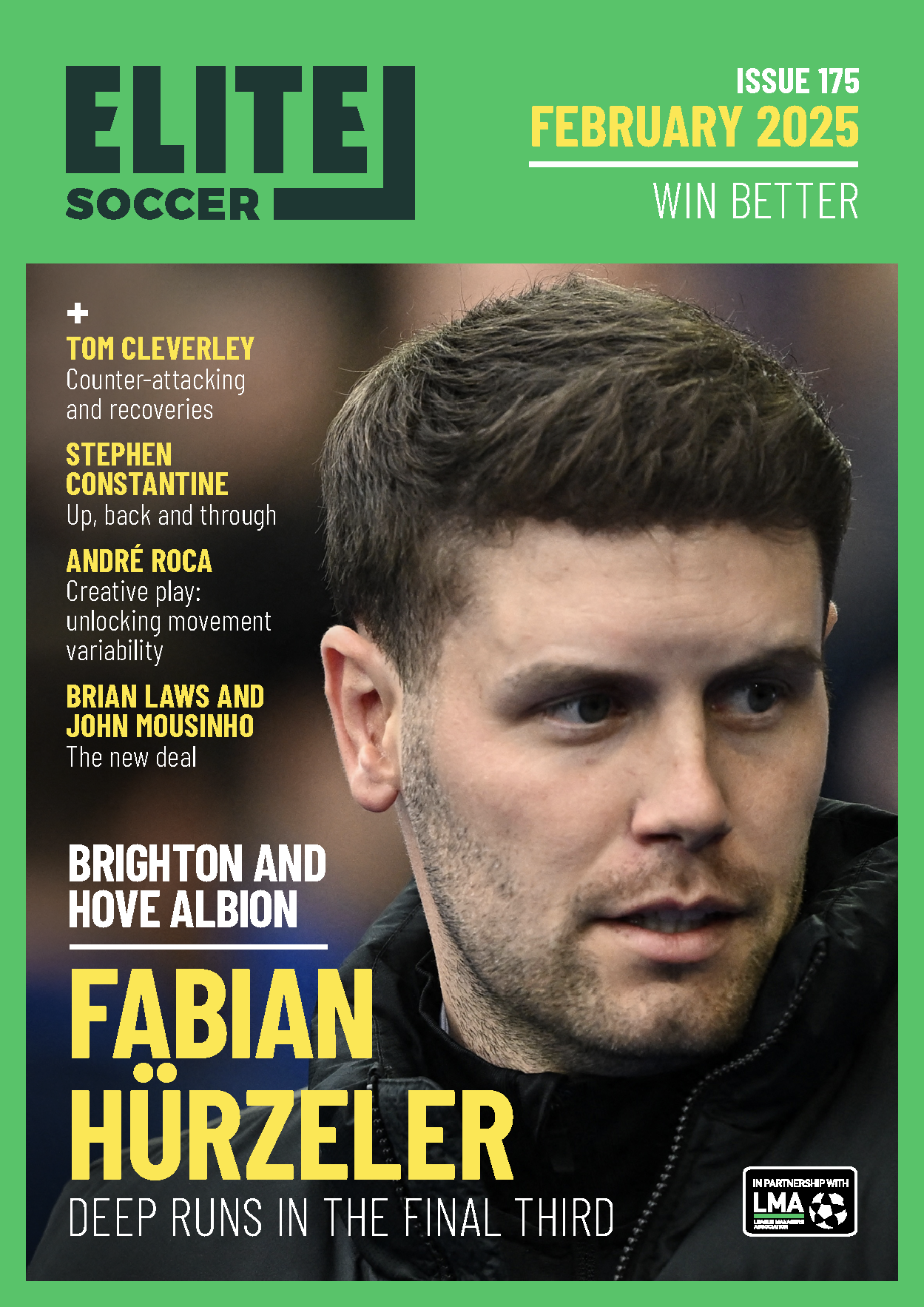You are viewing 1 of your 1 free articles
The Elite Soccer Coaching Award
A new coaching award, developed by Ben Bartlett in partnership with Elite Soccer, is aiming to give coaches an extra edge. Ben explains the what, how and why behind it.
The Elite Soccer Coaching Award (ESCA) encourages coaches to make decisions relevant to their context and more deeply understand how to coach and support players to grow, love, and be better at the game.
The award is intended to give coaches a broad yet, at the same time, deep exploration of the game of soccer and of player development. It explores how to consciously and cognitively coach the players and the way you see the game playing out across time.
CHANGING THE LANDSCAPE OF COACH EDUCATION
Historically, coach education has often focused a lot on the ‘what’ and the ‘how’, but hasn’t necessarily helped coaches underpin the ‘why’. My experience of formal, traditional coach education is that there isn’t a lot of exploration of why we do what we do.
Often, it’s: “This is how to play a 4-4-2,” or “This is how to develop your players”. But there are lots of different ways to play soccer. There are lots of different ways to support player development. And, there are lots of different ways, as a consequence, to coach it.
There is a risk that the game is becoming homogeneous. Many teams build up play and press the same way. Many coaches are aspiring to be like those that are perceived to be the top coaches in the game. But there is an inherent risk that, as soon as you try to be somebody that’s already established, you fall a long way short and become a distant second, third, fourth, fifth or sixth to what’s already out there.
Many coaching qualifications are mandatory. You need to do a particular qualification to have the ticket, to be able to coach in a particular environment. That is good from a standards perspective, but standards can often lead to standardisation. That’s to say that a standard drives everybody to do the same thing in the same way, to meet the standard.
A lot of the time, a ticket gives you the opportunity to ride. It doesn’t actually support understanding of direction you might take with that ticket.
The ESCA looks to give you that direction. It encourages coaches to explore and understand their why: what’s important in their context, why it’s important and how the game of soccer and player development line up with the things that are important.
BUILDING A SYLLABUS FOR AN AWARD THAT SUGGESTS THERE IS NO SYLLABUS
The main structure that underpins the course is three core principles, or values.
The first is decision making. Coaches will have the opportunity to make decisions based upon the demands of their context. The intention is that coaches will then enable players to make decisions based upon the circumstances that they find themselves in within any game. The aim is that coaches who can make decisions can support players who can make decisions.
The second is being person-centred. The award centres and focuses upon each individual coach’s context with the aspiration that all of us as coaches will be person-centred in the way that we approach player development. The more deeply we understand the players in our care, the more likely we are to be able to interact and support their learning in a way that they respond to positively.
The third is integrity. Integrity, in a broad sense, is just doing what you say you’re going to do. At the outset of the award, coaches are encouraged to highlight what’s important in their context and ensure that every single decision that they make lines up with the things that they said were important.
“There is a risk that the game is becoming homogeneous”
Beyond that, the award looks to provide some backdrop about some ways that we might consider playing football, but ultimately asks coaches to decide what they stand for and what is important to them.
If we want other people to be able to say what’s important in their context, we need to have some clarity about what’s important to us. So, I offer clarity on what’s important to me in my environment, and invite coaches to use that as a jumping off point to get clarity on what’s important in theirs. Then we can really delve into what that looks like, more deeply developing our own individual game model.
This is broken down into four main components:
- Component 01: Playing football
We look at beliefs people may hold about learning and playing football as well as some team principles, conscious strategies and specific tactics.
- Component 02: Player development
We look to more deeply understand players and player development journeys, including some individual principles, strategies and tactics.
- Component 03: Coaching football and players
We consider how we might blend our playing style with our understanding of the players in our care, supporting us to coach football and coach players synonymously.
- Component 04: What we measure
We look at what we measure, not only from a numbers and data standpoint, but from the perspective of: are we doing what we said we were going to do?
RESPONSIVE, ROUSING AND RESILIENT
Throughout the course, we encourage coaches to develop an approach to football which is responsive, rousing and resilient - the three Rs.
Responsive means being both responsive to the players and to what’s going on in the game on any given day.
Rousing means that the players are excited, or if their parents, grandparents, or any other supporters, come to watch, they’re excited. As a coach, you’re connected to the game, whether you’re working in an academy or a senior environment where people pay to come and watch.
The idea of being resilient is not to take pressure and stay the same, but that we take pressure and adapt such that we and our playing style changes across time. So what we say is important today might differ subtly or significantly tomorrow because we recognise the more we show people what we do and how we do it, the more likely they are to adapt their approach to try to stop us.
So to be resilient, we need to be able to change from day to day, but we also need the industry and the game to be resilient across a number of years. We need to continue to ensure that the players and the coaches that we develop bring so many of those exciting tools to the table that make people want to continue to engage with it.
Then, from a measurement perspective, we want to make sure that whatever it is that we measure is aligned to what we value – the three Rs – rather than only valuing what we can arbitrarily measure.
AN AWARD FOR INDUSTRY
The Elite Soccer Coaching Award is flexible and responsive. The award, its content, and your opportunity to build a dossier of your work will respond to where you’re currently at, both in terms of your current capacity and the environment in which you’re working.
The ESCA is for coaches that want to more deeply understand themselves and their coaching or progress their coaching career. The opportunities that an award of this nature will open up will, in some parts, enable coaches to express what they’ve come to understand about themselves and their coaching, perhaps to a greater level than many people that won’t have engaged with this content.
It will also enable coaches to demonstrate the will to go above and beyond what most people, or the majority of other people, are doing.
For those currently working in environments and roles they’re happy in, the intention is that they explore their existing work.
I know from experience that when you’re coaching consistently - for two, three, four, five years and beyond – you don’t necessarily become tired or lazy, but you can fall into a routine of knowing what works for you in your context, and you roll out the same stuff day after day, week after week, season after season. And because of the chaotic nature of the industry, perhaps you don’t spend as much time reflecting on your work as you might like.
What the award will do for these coaches is enable a deeper set of reflections and challenges around those existing processes to say: Is what you’re doing optimal? Can what you do be better as a consequence? The new age of coaching is going to require coaches to be able to understand what’s important in their context and change some of their behaviours accordingly.
The aspiration for the award is that people who already have the mandatory qualifications can refine the way that they think about their coaching. Those that aspire to get access to some of those environments and those qualifications in time can deepen their understanding, which can aid future learning in more formal environments.
Related Files
THE FORMAT OF THE AWARD
The award is a comprehensive collection of resources aligned to each of the course components. The idea is that we provide coaches with a range of resources they can use to support their own development while encouraging them to build their own resources. Such resources support us all to more deeply come to understand what’s important in any context and develop a whole range of tactics and approaches that will support delivering within it, coherently.
The course content includes video workshops – in which I talk through concepts and ideas, using animation and game footage to support learning – reading materials, calls with me, Q&A sessions with expert contributors and forums for coaches to discuss coaching challenges with each other.
The quality of any educational programme is often embedded within the social interactions that the coaches and the learners have with both the people that are at the front of the room, but also the people that sit next to them in the room. It’s really important to recognise that. While the qualification is online, mobile, and accessible, it’s still social, it’s still interactive, and it provides a whole range of opportunities for coaches to engage with each other and with the people responsible for delivering the course.
The course is delivered flexibly, so it’s remote, it’s online, coaches can approach and connect with the content at a pace that works for them.
As the course progresses, coaches are encouraged to build what we refer to as a ‘dossier’.
The dossier essentially says: These are the things that I stand for. Here’s the evidence of the work that I’ve done. This is, consequently, how I’ve come to better understand myself and my approach to coaching.
“Coaches are encouraged to build what we refer to as a ‘dossier’”
The deeper personal clarity and coherence that the dossier will provide will be something that coaches can present in a large form presentation, but also be able to speak about offhand because they’ve come to more deeply understand themselves.
It’s something of a shift from traditional assessment in many forms of education, where assessment is either everybody completing the same assignment, or everybody completing the same test, and being measured to the degree to which they fulfil the standards. As with all of the ESCA, the assessment element is tailored to the learner.
Editor's Picks
Deep runs in the final third
Using the goalkeeper in build-up play
Pressing principles
Intensive boxes drill with goals
Penetrating the final third
Creating and finishing
My philosophy
Pressing initiation
Compact team movement
Coaches' Testimonials

Alan Pardew

Arsène Wenger

Brendan Rodgers

Carlos Carvalhal

José Mourinho

Jürgen Klopp

Pep Guardiola

Roy Hodgson

Sir Alex Ferguson

Steven Gerrard
Coaches' Testimonials

Gerald Kearney, Downtown Las Vegas Soccer Club

Paul Butler, Florida, USA

Rick Shields, Springboro, USA

Tony Green, Pierrefonds Titans, Quebec, Canada
Join the world's leading coaches and managers and discover for yourself one of the best kept secrets in coaching. No other training tool on the planet is written or read by the calibre of names you’ll find in Elite Soccer.
In a recent survey 92% of subscribers said Elite Soccer makes them more confident, 89% said it makes them a more effective coach and 91% said it makes them more inspired.
Get Monthly Inspiration
All the latest techniques and approaches
Since 2010 Elite Soccer has given subscribers exclusive insight into the training ground practices of the world’s best coaches. Published in partnership with the League Managers Association we have unparalleled access to the leading lights in the English leagues, as well as a host of international managers.
Elite Soccer exclusively features sessions written by the coaches themselves. There are no observed sessions and no sessions “in the style of”, just first-hand advice delivered direct to you from the coach.







